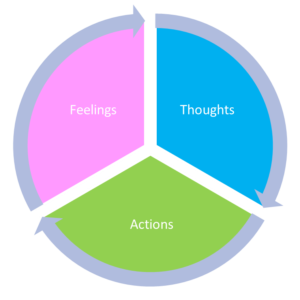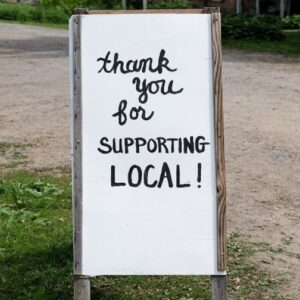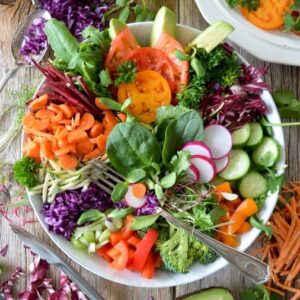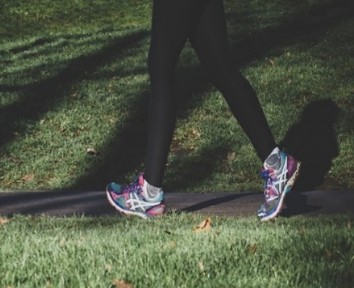by Rev. Racquel Ray,
Assoc. Minister of Congregational Life
I’ve been thinking a lot about the food we eat. In the spring of this year, I preached about the need for wellness as we restore our communities past the covid pandemic. Our discussions around wellness resulted in this summer’s walking group. Spending early mornings in nature with friends was delightful to the soul.
 There is a principle in the wellness journey of connecting actions, thoughts, and feelings. The more we do an activity, the more we think about it, and the more we process our feelings. These three are connected in a cycle. The more we feel the more we think. And the more we think and feel, the more we act.
There is a principle in the wellness journey of connecting actions, thoughts, and feelings. The more we do an activity, the more we think about it, and the more we process our feelings. These three are connected in a cycle. The more we feel the more we think. And the more we think and feel, the more we act.
Over the past several months, I have wondered how this applies to the other aspects of wellness: financial, spiritual, relational, emotional, and physical. The adage ‘fake it till you make it’ presents aspects of challenging mental heal implications. But, it does ring true for stopping behaviors that do not serve our wellbeing and adding activities that do. Taking a walk leads to thinking about the benefits of walking and the feelings of wellness, strength, vitality. Going to church leads to thinking about the benefits of being surrounded by a loving community of believers and the feelings of belonging, welcome, and purpose.
 I wonder how this applies to nutrition and our local food systems. As grocery prices continue to soar, we turned to growing more of our own food in the backyard garden. We have been deliberate about harvest and preserving our bounty. I have spent some time returning to local farms to fill in what we have not grown. Local bakeries, local butchers, local dairies, and local orchards are of interest. To accompany my thoughts, actions, and feelings around our local food systems, I’m also reading The Omnivores Dilemma by Michael Pollan. (Pollan, 2007)
I wonder how this applies to nutrition and our local food systems. As grocery prices continue to soar, we turned to growing more of our own food in the backyard garden. We have been deliberate about harvest and preserving our bounty. I have spent some time returning to local farms to fill in what we have not grown. Local bakeries, local butchers, local dairies, and local orchards are of interest. To accompany my thoughts, actions, and feelings around our local food systems, I’m also reading The Omnivores Dilemma by Michael Pollan. (Pollan, 2007)
It seems the dilemmas we face beyond shopping politically are practical. How can we afford to feed our families and what will they eat? How can folks with modest income afford groceries? How can food and nutrition affect our health and wellness: thoughts, feelings, and actions?
I am reminded of Genesis 2: “Now the Lord God had planted a garden in the east, in Eden; and there he put the man he had formed. The Lord God made all kinds of trees grow out of the ground—trees that were pleasing to the eye and good for food. In the middle of the garden were the tree of life and the tree of the knowledge of good and evil. A river watering the garden flowed from Eden; from there it was separated into four headwaters…The Lord God took the man and put him in the Garden of Eden to work it and take care of it…The Lord God said, ‘It is not good for the man to be alone. I will make a helper suitable for him’…Adam and his wife were both naked, and they felt no shame.” (Genesis Ch. 2 paraphrased)
The Genesis story is familiar to most of us. And yet, if we take a close look, we can see ribbons of action, thoughts, feelings running through God’s provision and Adam’s process. Adam was present in the garden with every tree that was pleasing to the eye and good for food and fresh water. Adam’s action was to tend the garden. As Adam tended the garden, Adam thought he was lonely and God provided a helper. Adam and Eve worked together in the garden and felt no shame.
 It seems that as humans, we are provided every plant for our nourishment and fresh water. We are to care for our environments which provide that food and drink. And, our environments are both pleasing to the eye and good for our bodies. And when we do that in partnership with each other we feel no shame. In fact, when we are attentive to the world around us and the provisions around us we find community and contentment.
It seems that as humans, we are provided every plant for our nourishment and fresh water. We are to care for our environments which provide that food and drink. And, our environments are both pleasing to the eye and good for our bodies. And when we do that in partnership with each other we feel no shame. In fact, when we are attentive to the world around us and the provisions around us we find community and contentment.
Looking toward our own community’s food systems we see a few local farms and a few farm stands. We can meet our farmers and may even be able to pick our own food. We can grow food in our yards or in pots or planters. We can even grow food on our windowsills! At our local farms and farmer’s markets we can meet other people who share our concerns for the local foods systems. We can feel a sense of connection with both the earth and the community; as though we are a part of that cycle. The food we eat is one part of our connectedness to God, Neighbor, and Self.



